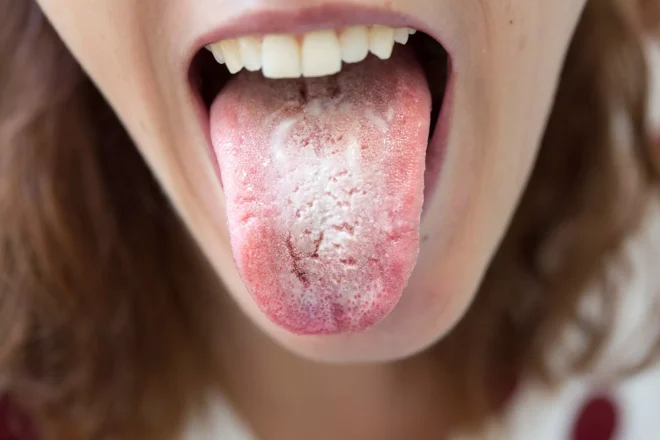
Candida Overgrowth Symptoms + 3 Steps to Naturally Cure It!
Candida can cause all kinds of problems in the body, and the worst part is that most people don’t even know they have it.
What is Candida?
Candida is a type of fungus that lives in the mouth and intestines. It helps absorption and digestion. Problems occur when Candida overproduces. When the immune system is weak, the health of Candida in the body can be affected and lead to yeast infections.
This can be caused by many things. It is caused by taking antibiotics that kill many healthy bacteria in the body. Excessive consumption of alcohol, sugar, refined carbohydrates and fermented foods is also a factor in candida overgrowth. Candida overgrowth can harm the body and lead to many health problems.
What are the symptoms of Candida Overgrowth?
The symptoms below will help you determine if you have candida, then we’ll talk about how you can treat it!
1. Oral Thrush
We’ll start with one of the most visible and easily recognizable symptoms of Candida overgrowth. According to the Mayo Clinic, oral thrush is a disease in which the Candida albicans fungus accumulates in the lining of the mouth.
Symptoms of oral thrush include:
- White coating on tongue, cheeks and tonsils
- White sores on the tongue or around the mouth
- Bad breath
- Redness or soreness in the mouth
- Lost taste
- Oral bleeding or rupture
If you have one or more of the following symptoms, you may have candida.

2. Fungal infections of skin and nails
Candida can cause yeast infections, athlete’s foot, and toenail fungus. If these infections occur frequently, especially after treatment, you may have a Candida infection.
3. Fatigue
This question can be a little complicated because chronic fatigue can be caused by many things, not just Candida. Abnormalities in the body and digestive system are symptoms of candida overgrowth and can cause fatigue.
If you still feel tired or weak even though you get enough rest each night, this may be a sign that you have candida.
4. Chronic sinus infections and other allergy symptoms
Candida can cause ulcers and allergic symptoms such as urinary retention, fever, cough, shortness of breath, headache, sinus pressure, and congestion.
If you are prone to allergies and sinus problems, this may be more difficult to diagnose. Read the other symptoms carefully to determine if you are suffering from them. This will help you determine if Candida is the underlying problem.
5. Strong cravings for sugar
When the body is weakened and the digestive system is damaged, you may suffer from malnutrition because the body cannot process food and absorb nutrients properly.
These deficiencies can lead to severe diabetes. This makes the situation worse because sugar helps candida grow and make the problem worse.

6. Difficulty focusing and concentrating (brain fog)
Candida can cause a variety of psychological problems, most of which fall into the “brain fog” category.
These symptoms may occur with severe stress; so be sure to try to identify one or more of the other symptoms on the list.
7. Hormone imbalance
Candida can produce chemicals that affect estrogen. Hormonal imbalances can cause decreased libido, early menopause, PMS, migraines, bloating, and weight gain.
These are also the symptoms of a pregnant woman; So listen to your body and see if you have symptoms that are more severe than normal menstrual bleeding.
8. Weak immunity
As mentioned before, Candida overgrowth can occur when the body is weak. This imbalance can immobilize the body until the candida infection heals.
A weak immunity can cause many symptoms of this form. If you often feel weak, sick, or tired, this may be a sign that you have a candida infection.
9. Digestive problems
An overgrowth of Candida can kill the healthy bacteria in your digestive tract. The healthy bacteria can’t process food properly, and infections, diseases, and other problems can occur.
This can cause other digestive problems such as constipation, diarrhoea, gas, indigestion, colic, and other stomach problems.
10. Urinary tract infection
Although these symptoms are rare, they are worth mentioning. Candida can cause urinary tract infections and other genital infections and problems in women.
If you are experiencing these problems and they persist, you may have a Candida infection.

Candida Overgrowth Symptoms
Candida overgrowth can cause a variety of symptoms, including:
- Digestive issues like bloating, gas, constipation, or diarrhea
- Fatigue, brain fog, and difficulty concentrating
- Frequent yeast infections or fungal infections
- Skin issues like rashes, eczema, or acne
- Mood changes, anxiety, or depression
- Seasonal allergies or sinus infections
- Joint pain or muscle aches
- Bad breath or a white coated tongue
Candida is a type of yeast that naturally occurs in the gut, but an overgrowth can lead to these problematic symptoms. Factors like a diet high in sugar and refined carbs, antibiotic use, stress, and a weakened immune system can contribute to Candida overgrowth.
3 Steps to Naturally Cure Candida Overgrowth
- Adjust Your Diet – Eliminate foods that feed Candida, like sugar, refined carbs, alcohol, and moldy foods. Focus on eating plenty of non-starchy vegetables, healthy fats, and moderate amounts of low-sugar fruits and lean proteins.
- Take Antifungal Supplements – Supplements like caprylic acid, oregano oil, berberine, and probiotic strains can help balance gut flora and inhibit Candida growth. Work with a healthcare provider to find the right supplements for your needs.
- Reduce Stress – Stress can weaken the immune system and exacerbate Candida. Practice stress management techniques like meditation, yoga, deep breathing, or getting enough sleep.
Making these diet and lifestyle changes can help your body regain control over Candida and alleviate the troublesome symptoms. Be patient, as it can take several months to fully resolve a Candida overgrowth. Consulting a naturopathic doctor can also provide personalized guidance.

What happens if candida is left untreated?
Candida can cause many problems if left untreated. First, it can cause indigestion, which damages the intestinal lining and allows toxins and bacteria to enter the bloodstream.
Leaky gut can cause many problems, including food allergies, inflammation, and even autoimmune diseases.
Second, Candida can also cause fatigue, confusion, and negative emotions. This is because Candida causes these symptoms by releasing toxins into the bloodstream.
Finally, if left untreated, Candida can lead to more serious problems such as urinary tract infections, joint pain, rashes, and even thrush. Oral thrush is an oral infection that causes white bumps on the tongue and throat.
